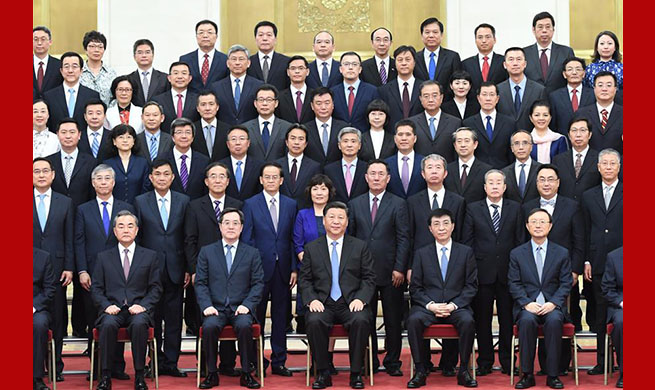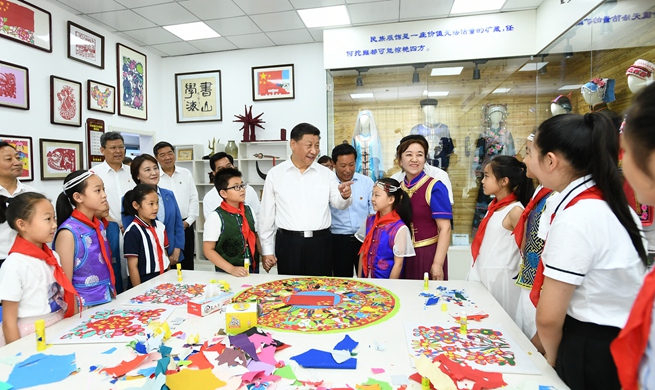SAN FRANCISCO, July 18 (Xinhua) -- California officials and lawmakers have voiced deep concern about the state's economy being affected by the U.S.-initiated trade disputes with China.
CALIFORNIA PAYS DEARLY
Appearing before a hearing called by two California Assembly committees on China-U.S. trade tensions on Wednesday, California Lieutenant Governor Eleni Kounalakis said that rapidly changing federal trade policies are impacting California disproportionately "because of the size of the California economy and our inter-dependence on foreign trade."
"All of this is especially worrisome for the state of California," she said, adding that about 20 percent of employment in California is dependent on international trade and investment, equivalent to about 5.4 million jobs.
California is already feeling the impact of the U.S.-China trade frictions, she said, citing the figure of the U.S. Chamber of Commerce which showed that over 13 billion U.S. dollars of Californian exports are threatened by the tariffs.
"Exports to China from California ports were down nine percent year to date in 2019 compared to the first five months of 2018," she said.
In 2018, China was California's third largest trading partner, following Mexico and Canada, and Chinese investors are a leading source of foreign direct investment to California, according to official data.
AGRICULTURE TAKES BIGGEST HIT
California's agricultural sector was the hardest hit by the U.S.-China trade disputes, with the biggest drop in exports to China, Phil Ting, chair of the Assembly Select Committee on Asia/California Trade and Investment Promotion, told Xinhua ahead of the hearing.
American wine exports to China have fallen by 25 percent, with 90 percent of the loss coming from California, since the U.S. administration escalated trade frictions with China by imposing steep tariffs early this year, Ting added.
"Obviously, we're very concerned about the tariffs that have been put in place over the last couple of years ... in particular tariffs on agricultural goods, which have a very negative impact on California, the largest agricultural-producing state in the country," he said.
These exports covered wine, fruits, vegetables and many other goods that are exported from California to China, Ting said.
"We've already seen a devastating effect in terms of exports to China," said the California Assembly leader.
During her hearing, Kounalakis listed the almond industry as an example, which generates about 104,000 jobs in California, and has seen a significant impact since last year with a decrease of about one third in American almond exports to China.
Although the White House has promised to grant relief packages to farmers impacted by the trade tensions, Kounalakis said the best assistance to farmers and ranchers would be to resolve the trade disputes and reopen markets for California farm products.
"We're going to see a potential loss of jobs, especially in the agricultural industry, which is already a very challenging industry to employ into making a living out of," Ting said.
The Golden State wants to continue to foster a stronger economic relationship with China, Ting added.
LONGING FOR STRONG CHINA-U.S. RELATIONS
Trade and economic activities between the United States and China, and those between California and China, have been "incredibly important to our economy and to our community," said Assemblymember David Chiu.
"Trade wars do not help anyone," he added.
Chinese Deputy Consul General in San Francisco Ren Faqiang said during the hearing on Wednesday that China is willing to work with the United States to properly resolve the trade frictions based on the latest consensus reached by the leaders of the two countries.
Noting that California is one of the U.S. states which enjoys a lot of mutually beneficial cooperation with China, Ren said a sound China-U.S. relationship serves not only the common interests of the two countries, but also the common aspirations of the international community.
Kounalakis said the trade tension between China and the United States has not only affected imports and exports, but also spilled over to other areas such as cultural and people-to-people exchanges.
What people should be concerned about is that "really a tension over trade has turned into tension over other things," such as the normal exchanges between Chinese and American people, Kounalakis said.
She said that people-to-people exchanges are vital to mutual understanding and "that we have got to get back to the negotiation table" to restore the climate of friendship between the two countries.
"Getting to some kind of agreement and resolution so that we can quickly get back to friendly feelings is very, very important," she said.













